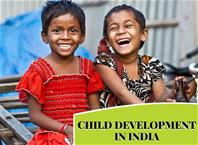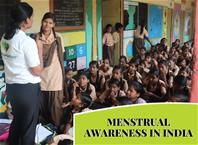
Our Blogs

Why Menstrual Hygiene Awareness Is Required in Rural/Slums in India
In India alone, there are more than 355 million females who menstruate. Across the country, so many of them face several barriers with regards to menstrual hygiene. Statistics have shown that about 71% of these girls do not have a general knowledge on menstruation even before they begin their periods. The percentage of women who cannot afford to buy sanitary pads has risen to 70%. Another report made in 2012 affirms that a huge percentage of government-owned schools do not have a good functioning toilet or even a separate toilet for girls.
The international menstrual hygiene day is observed on the 28th of May each year. Women empowerment NGOs in India use this day to raise menstrual hygiene awareness in the country. This includes enlightening women in the country on the need for personal menstrual hygiene and other important menstrual practices. The I CAN Foundation, one of the best NGO for Women Empowerment in India, is devoted to this cause. I Can Foundation’s main objective is to educate and aware women of India about the fundamental knowledge of health care and teach them to use hygiene products during menstruation & pregnancy.
About Menstrual Hygiene
Before we continue, it is important to explain what menstruation is. In layman understanding, menstruation
is that period of the month when a woman loses blood. I Can Foundation in India noticed that this process can pose a challenge to women today, especially those who have little resources or information on how to practice good menstrual hygiene. There are several myths that exist in Indian culture/tradition. Women with body fluids, such as menstruating women, are viewed as religiously impure and were often times not allowed to go into a temple or to even serve foods. This is a controversial issue in India today.
Sanitation is an important part of menstrual hygiene. In some rural parts of India, I Can Foundation noticed that there is a huge challenge resulting from the unavailability of private bathing spaces. Due to limited hand pumps found on roadsides, rural dwellers are forced to bath in the open. This is unhygienic as several women using the place would often wash their menstrual cloths there and it would leave the place unclean for others as well as foster the spread of infections. Building a community bathroom is a key innovation to enable these women to deal with hygiene challenges.
Most times, it is not surprising to hear that there are no gynecologists in these rural areas that would help in
emergency situations or with delivery. It is a miracle how women are able to cope in these areas, especially
in places like Guptkashi, Uttarakhand. In these scenarios I Can Foundation conduct free health check ups in these slum area.
Even in areas where there is an availability of primary healthcare centers and hospitals, there are still
challenging situations. According to an international report made in 2013, it was stated that most junior
doctors in these hospitals are under trained and do not have the capability to manage menstrual hygiene
properly. It is also challenging for rural dwellers to travel long distances in search of a good hospital.
Ignorance is a disease as often stated. Most women are ignorant about issues of mental hygiene and this
cause several problems. Major issues such as period irregularities are often overlooked. There was a report
of a girl who had such irregularities and didn’t give much thought to it. She was admitted in an emergency
room after experiencing severe blood loss and was later diagnosed with uterus cancer. Soon after that, her
uterus had to be removed and now she cannot menstruate.
These kinds of reports can be averted through menstrual hygiene awareness in India. I Can Foundation thinks that Menstrual issues should be given utmost priorities. The health system in these areas should be paid attention to.
Women should also be encouraged to speak out on matters like this. This will bolster their confidence and
encourage them positively to put away embarrassment or shame in order to freely visit health facilities.
Water is a really precious commodity in rural areas as there are only limited hand pumps available. Women
have to pass through much stress before getting water. Most of their time is spent carrying out this task while
working. Women are responsible for taking care of the families as it is typical of the men to migrate to the
city. Because of the situation they find themselves in, these women do not pay attention to menstrual
hygiene and as such, they need to be better equipped with sanitary pads.
Using menstrual cloths should be discouraged as it is very unhygienic and could result in an infection. They
also pose an environmental hazard. Sanitary pads are a better option today and the use of this should be
promoted in the country. The challenge faced by these rural dwellers on the use of sanitary pads is the
expensive nature of it. To counter this, sanitary pads can be made available through government initiatives.
Women like these, who dwell in rural areas, need help on how to practice mental hygiene. This is what I
CAN Foundation, an NGO located in Jaipur, Rajasthan, is determined to do all over India for Women
Empowerment and to educate them about Menstrual Hygiene.
Other projects being carried out by the I CAN Foundation in India to Empower women include:
• Empowering Women: I Can Foundation Teaches employable skills to women like beautician techniques, stitching,
embroidery, fashion designing and making products to create a home business. Helping them to find stable
financial status so that they can see more opportunities to build a good future.
• Women Hygiene & Health Care: In a nation where ladies have achieved the outskirts of the room, essential
necessities, for example, access to clean drinking water, toilets, essential instruction, central learning, and
items for ladylike cleanliness are as yet inaccessible to ladies in rural areas.
If you are impressed by the work being done by I can Foundation, you might want to make a donation for this
cause. You can do this by donating for
• single pad cost
• one awareness campaign cost in which we donate 100+ sanitary pads which cost is INR 2500.
If you wish to give non-financial support, you can do this by
• donating sanitary pads
• volunteering with us
Share This Article
0 Comments
In a compartmentalized world, the rights of women and those of children have often been promoted in isolation from one another.
"I CAN" shows how discrimination and other human rights violations against women affect children and vice versa.
About Us
Our Work
Contact Us
Address:56 - C, First Floor, Opposite Hotel Hilton, Hawa Sadak,
Civil Lines, Jaipur, Rajasthan 302006Phone: +91 730 000 1413
Email: [email protected]
Our Causes
We are effectively working for major development issues: promoting the human rights of adolescent girls, eliminating child marriage, Gender equality, the protection of human rights, especially of children, survival, protection, development and participation of every child and women of India.
Read more
Quick Links
Help Building in Better World
Your donation helps to improve the lives of people in and from foster care.
Donate Now







